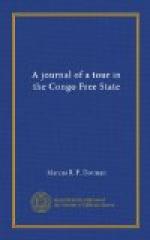From time to time the Congo Government has been charged with forcing the natives to work against their will and with ill-treating them, and it has also been alleged that the native soldiers committed many atrocities during the wars against the revolting tribes. Many of these charges have been collected and published in Civilisation in Congoland written by Mr. H.R. Fox-Bourne, the Secretary of the Aborigines Protection Society. The author has not travelled in the country himself, but relies chiefly upon the evidence of the late Mr. Edward Glave, at one time an official of the Congo International Association, and of the late Mr. Sjoeblom who was a Swedish Missionary in the Congo. The book is not cheerful reading, for indeed it is chiefly a record of crimes which have been committed in the past.
It has been frequently stated that acting under the orders, or at least with the connivance of the agents of the Congo State and those of the Commercial Companies in the country, the native police or sentries have punished in a most barbarous manner all those natives who refused to work. It is alleged indeed, that these sentries have actually cut off the hands of those who did not collect the rubber or food-stuff demanded by the agents. To even read of such sickening horrors is terrible, and I was therefore much relieved to find that none of the State officials on board had ever seen natives maimed in that or any other manner by the soldiers of the State. There seems however, to be no doubt that the native chiefs in the past mutilated both the living and dead as punishment for crime. Mgr. Derikx told me that he had heard of a case where a chief had ordered that the hand of his own son should be cut off because he had committed adultery with one of his numerous wives.
We arrived at Dakar, the capital of the French colony of Senegambia, at daylight on July 3rd. Navigation is not easy here, for a reef runs parallel to the coast and the channel between, is neither broad nor deep. The town is built on the shores of a bay and faces an island strongly fortified. The whole colony is being rapidly developed; a railway runs to St. Louis and roads are being constructed across the desert towards Timbuctoo and the northern coasts. A flourishing industry in palm oil is carried on and Dakar is also an important military centre. Several of the officers however, were engaged in the peaceful pursuit of fishing at the end of the breakwater when we arrived.
At Dakar, Commandant and Madame Sillye come on board. The former has served for ten years in the Congo and is now taking out ten horses purchased in Senegambia, from which he hopes to breed. They are a fine looking set, very quiet and well behaved, and take up their quarters opposite the camels without creating any disturbance. We have now quite a menagerie on board. Besides the camels and horses, there are pigeons to be trained as carriers, guinea pigs with which the doctors investigating the terrible disease the Sleeping Sickness, will experiment and several dogs belonging to the passengers. Various kinds of rubber and other living plants also occupy an appreciable part of the promenade deck. Passengers and cargo indeed, are strong evidence of the earnest way in which the Congo is being developed.




